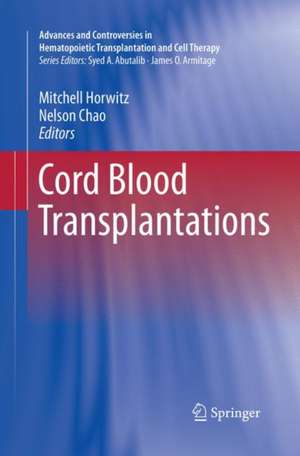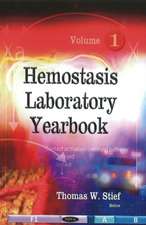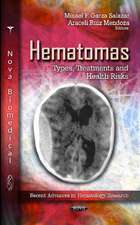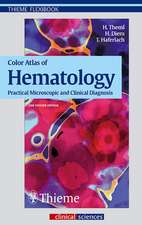Cord Blood Transplantations: Advances and Controversies in Hematopoietic Transplantation and Cell Therapy
Editat de Mitchell Horwitz, Nelson Chaoen Limba Engleză Paperback – aug 2018
| Toate formatele și edițiile | Preț | Express |
|---|---|---|
| Paperback (1) | 711.11 lei 38-44 zile | |
| Springer International Publishing – aug 2018 | 711.11 lei 38-44 zile | |
| Hardback (1) | 851.60 lei 3-5 săpt. | |
| Springer International Publishing – 21 iul 2017 | 851.60 lei 3-5 săpt. |
Preț: 711.11 lei
Preț vechi: 748.53 lei
-5% Nou
Puncte Express: 1067
Preț estimativ în valută:
136.07€ • 142.45$ • 112.59£
136.07€ • 142.45$ • 112.59£
Carte tipărită la comandă
Livrare economică 01-07 aprilie
Preluare comenzi: 021 569.72.76
Specificații
ISBN-13: 9783319852010
ISBN-10: 3319852019
Pagini: 296
Ilustrații: VI, 296 p. 14 illus., 7 illus. in color.
Dimensiuni: 155 x 235 mm
Ediția:Softcover reprint of the original 1st ed. 2017
Editura: Springer International Publishing
Colecția Springer
Seria Advances and Controversies in Hematopoietic Transplantation and Cell Therapy
Locul publicării:Cham, Switzerland
ISBN-10: 3319852019
Pagini: 296
Ilustrații: VI, 296 p. 14 illus., 7 illus. in color.
Dimensiuni: 155 x 235 mm
Ediția:Softcover reprint of the original 1st ed. 2017
Editura: Springer International Publishing
Colecția Springer
Seria Advances and Controversies in Hematopoietic Transplantation and Cell Therapy
Locul publicării:Cham, Switzerland
Cuprins
Historical perspective and current trends.- Current cord blood banking concepts and practices.- Strategies for Cord Blood Graft Selection: Single or double cord blood unit for transplant: What have we learned?- Immunogenetics and cell dose considerations in cord blood transplants: What does matters?- Ex-vivo cord blood manipulation: Methods, data and challenges.- Conditioning regimens for cord blood transplants.- Cord blood transplants for non-neoplastic hematologic diseases: Data, consensus and challenges.- Cord Blood Transplants for Neoplastic Diseases in Children- Data, Consensus & Challenges: Cord blood transplants for myeloid malignancies in children.- Cord blood transplants for lymphoid malignancies in children.- Cord Blood Transplants for Neoplastic Diseases in Adults- Data, Consensus & Challenges: Cord blood transplants for myeloid malignancies in adults.- Cord blood transplants for lymphoid malignancies in adults.- Immune reconstitution after cord blood transplantation.- Cord blood transplants for non-hematopoietic disorders.- Cord blood transplants versus other sources of allografts: Comparison of data in adult setting.- Unique complications and limitations of cord blood transplants.- Future prospect of cord blood transplants.
Notă biografică
Dr. Horwitz is Professor of Medicine and director of the Adult Blood and Marrow Transplant Program in the Division of Hematologic Malignancies and Cellular Therapy at Duke University School of Medicine. Dr. Horwitz received his medical degree from Rush University in Chicago, and did his internal medicine training at Northwestern University. His specialty training in Hematology and Oncology was at the National Institutes of Health in Bethesda Maryland. Dr. Horwitz arrived at Duke University in 2003 where he is a translational clinical investigator with particular research interests that include adult umbilical cord blood transplantation and post transplant immune recovery. He is the director of clinical research within the Adult Blood and Marrow Transplant Program. He is a member of the steering committee of both the Blood and Marrow Transplant Clinical Trials Network and has served in a similar capacity for the Center for International Blood and Marrow Transplant Research.
Nelson J. Chao, MD, MBA, is the Donald D. and Elizabeth G. Cooke Professor in Cancer Research and Professor of Medicine and Immunology and the Chief of the Division of Hematological Malignancies and the Division of Cellular Therapy/BMT at Duke University. He received his undergraduate degree from Harvard University, MD from Yale University and his post-graduate training at Stanford University. He was the Associate Director of Stem Cell Transplantation at Stanford University prior to moving to Duke University in 1996 as the Director of the Bone Marrow Transplantation Program. The program was renamed as the Division of Cellular Therapy/BMT. He is also the Co-Director of the Clinical Stem Cell Transplantation Laboratory and continues to direct his own research laboratory focused on understanding and preventing graft-versus-host disease and improving immune reconstitution. He is also the Director of Global Cancer for the Duke Cancer Institute and the Duke Global Health Institute. In 2012, he has also become the Chief of the Division of Hematological Malignancies. He obtained his MBA from the Fuqua School of Business at Duke University in 2000. He is the author of approximately 250 peer-reviewed papers, 25 book chapters and one book. He is also a co-founder of two start-up biotechnology companies in Research Triangle Park, Aldagen and C2 Regenerate. Nationally, he is the co-chair of the Radiation Injury Treatment Network (RITN) and the principal investigator for a Center for Medical Countermeasures against Radiation (CMCR).
Nelson J. Chao, MD, MBA, is the Donald D. and Elizabeth G. Cooke Professor in Cancer Research and Professor of Medicine and Immunology and the Chief of the Division of Hematological Malignancies and the Division of Cellular Therapy/BMT at Duke University. He received his undergraduate degree from Harvard University, MD from Yale University and his post-graduate training at Stanford University. He was the Associate Director of Stem Cell Transplantation at Stanford University prior to moving to Duke University in 1996 as the Director of the Bone Marrow Transplantation Program. The program was renamed as the Division of Cellular Therapy/BMT. He is also the Co-Director of the Clinical Stem Cell Transplantation Laboratory and continues to direct his own research laboratory focused on understanding and preventing graft-versus-host disease and improving immune reconstitution. He is also the Director of Global Cancer for the Duke Cancer Institute and the Duke Global Health Institute. In 2012, he has also become the Chief of the Division of Hematological Malignancies. He obtained his MBA from the Fuqua School of Business at Duke University in 2000. He is the author of approximately 250 peer-reviewed papers, 25 book chapters and one book. He is also a co-founder of two start-up biotechnology companies in Research Triangle Park, Aldagen and C2 Regenerate. Nationally, he is the co-chair of the Radiation Injury Treatment Network (RITN) and the principal investigator for a Center for Medical Countermeasures against Radiation (CMCR).
Textul de pe ultima copertă
In this book, experts in the field express their well-reasoned opinions on a spectrum of important and complex issues in the area of cord blood transplantation. The aim is to provide practicing hematologists, including hematopoietic transplant physicians, with clinically relevant and immediately applicable information that will assist in the delivery of optimal care. The book opens by offering a historical perspective and examining current concepts and practices in cord blood banking. Sections are then devoted to strategies for cord blood graft selection and to areas of consensus and controversy in cord blood transplantation for neoplastic diseases - and nonmalignant - in children and adults. Attention is drawn to the implications of high-impact clinical trials whenever such trials are available. The readily intelligible text is complemented by numerous helpful tables, algorithms, and figures. This book will appeal to all residents, fellows, and faculty members responsible for the care of hematopoietic cell transplant patients and will offer a robust, engaging tool to aid vital activities in the daily work of every hematology and oncology trainee.
Caracteristici
Addresses key clinically relevant issues in cord blood transplantation Draws attention to the implications of high-impact clinical trials Assists hematologists and transplant physicians in the delivery of optimal care














